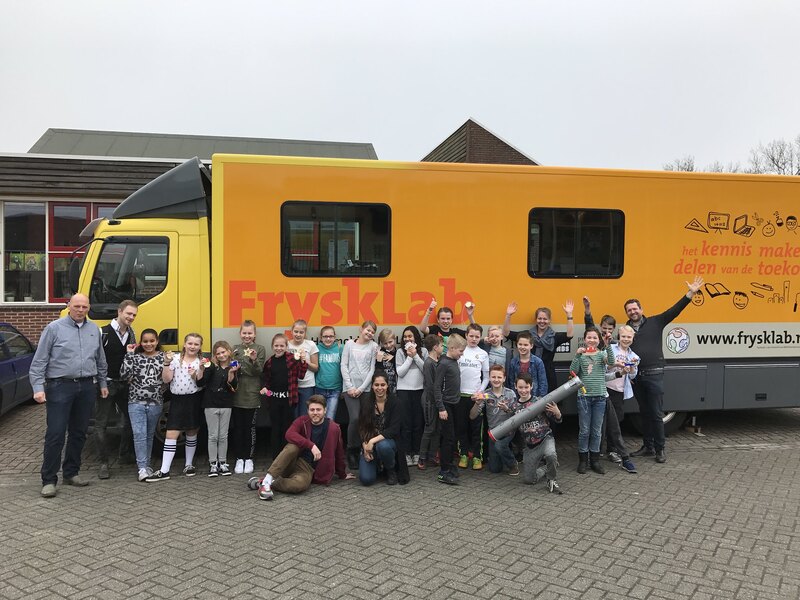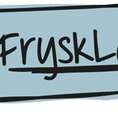
Zuiderkruisweg 4, Leeuwarden, Fryslân, 8938 AP, Netherlands
Lab tags:
Project FryskLab
FryskLab is an initiative of Fers (the service provider for public libraries in the Province of Friesland, The Netherlands). Friesland is a rural province in the northern part of the Netherlands and FryskLab, housed in a library truck, is Europe’s first official library FabLab. It has a team with a very diverse background, ranging from IT, arts management and library service management. The goal of Fers is to explore how a mobile FabLab contributes to the creative, technical and entrepreneurial skills development of children and young people. In the end the project should contribute to an increase in the innovative capacities of the province of Friesland as a whole.
The motto of the FryskLab project isn’t without reason knowledge-making and sharing of the future. The role of the library is that of facilitator, both in terms of physical capabilities (machines, tools, etc.), but also in the development of training and support. The principle here is that we look at FabLabs and makerspaces as the place where physical and digital use and knowledge-sharing converge. After all, users have the obligation to document their projects, after which they become available to others. In this development Fers is a Dutch and European frontrunner.
The FryskLab project was officially started in January 2014, after noticing that, especially in the US, libraries started to see the potential of working together with FabLabs and makerspaces or creating their own. The team at Fers received space and time to see if it could bring this development to the rural province of Fryslân. FryskLab uses the FabLab environment to bring 21st Century Skills to primary and secondary education. With a dedicated educational program the project tries to tackle specific local challenges.
The FryskLab truck
FryskLab is accommodated in a truck that formerly served as a traditional book mobile. The dimensions of the truck are 10.33 x 2.55 x 3.85 (LxWxH in meters) and the truck weighs 13.000 kg’s. FryskLab is mainly driven by two retired book mobile drivers. The FryskLab truck can comfortably host groups of 10-12 adults or 15-20 children/teenagers. If the weather is nice it is also possible to set up an open-air working environment outside of the truck. This has been done numerous times and is always an huge success. People are attracted by the new technology and playful setting in which they can tinker and experiment. It is also perfectly possible to bring working equipment inside schools or libraries to create an inhouse workshop environment. Since the truck has everything on hand it is easy to bring tools and equipment inside.
The mobile FabLab is first of all equipped with digital fabrication tools: 3D printers (Ultimaker Classic, six Ultimaker 2 Go’s, Builder and Up Plus) and a 3D scanner, laser cutter, vinyl cutter, 3Doodler pen and assorted hand tools. For designing-, documentation- and programming purposes we bring ten Macbook Airs and fifteen Dell laptops, plus an Apple TV to give presentations with. We use open source computer boards such as MaKey MaKeys and Arduinos and introduce visitors and students to electronics with littleBits kits. Strawbees are used to protope with 3D design using straws (bought cheaply from IKEA) and laser cutted connection parts. We use a wide variety of software including Scratch, Doodle3D, Cura, Repetier, 123Design, Inkscape, Photoshop Elements, Tinkercad, SketchUp Make, Sculptris, and Mozilla Webmaker. FryskLab features it’s own 4G networking router, which makes it possible to connect to the Internet almost anywhere. The truck also has a set up battery-packs with which it can run stand-alone for a maximum of four hours. When electricity is available 220 volts is sufficient to power all the necessary machines and lighting and heating.
Aan Kootstra works at Fers as a Digital Domain Specialist, and is the lab manager of FryskLab. “With our mobile lab,” he explained, “we want to contribute to the innovative capacity of the province. Technology will play an increasingly important role in our society. With the democratization of technology machines are becoming more affordable and in affordable range of citizens. Libraries can play a major role in familiarizing citizens with this technology.”
At the moment Fers is in talks with a large number of educational institutions (from primary schools to university level) to realize three so-called life-long digital fabrication learning courses based on the aforementioned themes. The result should be a high potential of skilled young talents for local companies which will benefit the local economic development that is lacking in qualified staff. This dedicated local focus is necessary to realize a sustainable (library-related) FabLab. Often we see examples of libraries setting up labs which are little more than a display for 3D printers and related machines. We however think the potential for digital fabrication in relation to libraries is much higher than just that. It’s about, quoting David Lankes:“the mission of librarians to improve society through facilitating knowledge creation in their communities”.
Timeline / Going places
January 2014: official start of the project
April 2014: project manager Jeroen de Boer talked about the project in Roskilde (Danmark) at the library conference Make of Die!, organised by Centralbibliothek. Via Skype he presented at Computers in Libraries (Hack the Library!).
May 2014: FryskLab drove to Aarhus (again Danmark) to be part of the Mini Maker Faire and hosting sessions especially for Danish library-colleagues.
November 2014: The core members of the FryskLab team received a Dutch library innovation award, the BibliotheekInitiatiefPrijs. In the same year the project was also shortlisted for another Dutch innovation award for the information-technology sector, the IVI Award.
February 2015: FryskLab went on an European road trip, the MakerTour2015, which led the mobile lab to the OCLC EMEARC Meeting in Florence and back. During this trip the team visited twelve (library) FabLabs in eight countries. In these FabLabs sessions were put together on the fly to find solutions for the visually impaired. The main goal of these sessions was to work out a prototype we had designed: an audio poster, powered by an Arduino computer. Our secondary goal during this trip was to convey the idea of the joining of libraries and the maker philosophy.
December 2015: FryskLab wins the Mediawijzer.net Stimulerings Award.
Januari 2016: Publication of Makerspaces in Libraries, written by Theresa Willingham and FryskLab project manager Jeroen de Boer.
Februari 2016: FryskLab wins IPON Award 2016 with the project Platform Maker Education.
October 2016: FryskLab produces ten library maker boxes, handed over in Brussels to members of European Parliament to celebrate the role of public libraries in coding and digital literacies.
June 2017: The American Library Association (ALA) awarded FryskLab as one of three winners of the "Presidential Citation for Innovative International Library Projects”. With the citation the IRRT (International Relations Round Table) Advisory Award Committee of the ALA recognizes FryskLab as innovative, unique and an inspiration for libraries worldwide. "That the largest library association in the world grants us this award is a great honor," said project manager Jeroen de Boer. "For us mentioning the importance of maker spaces in libraries by the ALA in 2014 was one of the most important motivations to start with FryskLab."
https://www.frysklab.nl
https://www.facebook.com/frysklab
https://www.flickr.com/photos/83026924@N03/albums
Contact: Jeroen de Boer jeroen@fers.nl 0031(0)582847743
Links
- https://www.flickr.com/photos/83026924@N03/albums
- http://twitter.com/frysklab
- http://facebook.com/frysklab
- http://www.frysklab.nl
- 3D printing
- Circuit production
- Laser
- Precision milling
- Vinyl cutting







